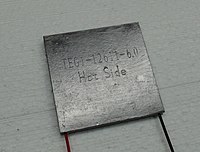
Photo from wikipedia
Abstract Thermoelectric power generation using distributed waste heat energy has received attention as a long-life, environmentally friendly power supply. The intermetallic compound Mg2Si is a lightweight, mid-temperature thermoelectric material that… Click to show full abstract
Abstract Thermoelectric power generation using distributed waste heat energy has received attention as a long-life, environmentally friendly power supply. The intermetallic compound Mg2Si is a lightweight, mid-temperature thermoelectric material that contains no toxic elements, and its thermoelectric performance has been enhanced by various methods such as impurity doping, nanostructuring, and alloying. In this study, we examined the influence of the influence of co-doping with Sb and dilute amounts of the isoelectronic impurity C on the thermoelectric properties of Mg2Si. We fabricated dense polycrystalline specimens of Mg2CxSbySi using the melting process and subsequent plasma-activated sintering. Doping Mg2Si with Sb increased the electrical conductivity ~102 times. Further co-doping with isoelectronic C did not significantly change the electrical conductivity; however, it did reduce the thermal conductivity independently of the electrical properties. Consequently, the specimens co-doped with Sb and C achieved higher thermoelectric performance than specimens of Mg2Si single-doped with Sb. The dimensionless figure of merit ZT of the co-doped specimens reached 0.79 at 873 K over the temperature range 323–873 K.
Journal Title: Journal of Alloys and Compounds
Year Published: 2022
Link to full text (if available)
Share on Social Media: Sign Up to like & get
recommendations!